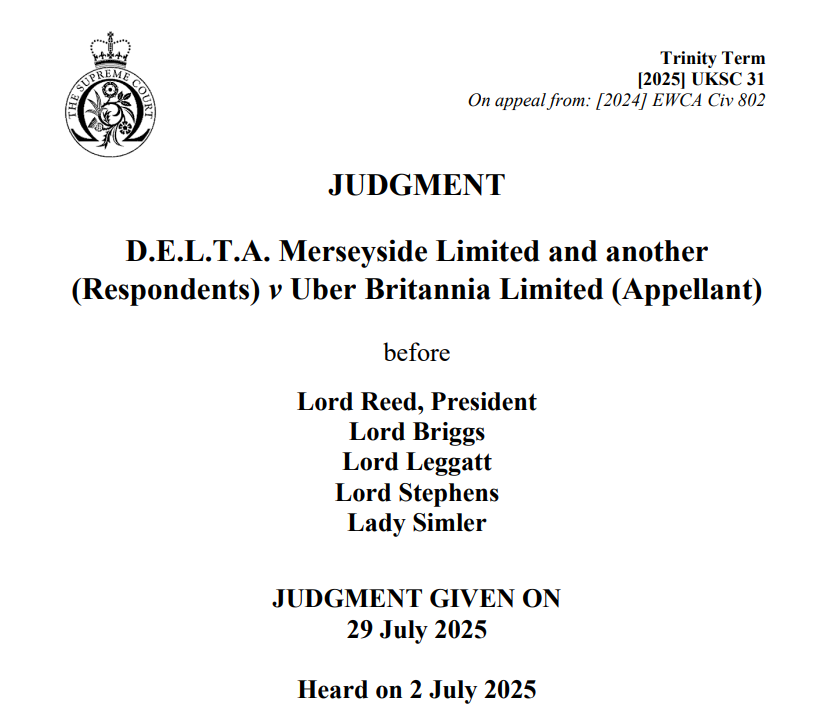Uber’s Hire Contract Challenge Fails: Supreme Court Preserves Operator Flexibility
- M.R Mishra

- Jul 29, 2025
- 3 min read
Updated: Jul 30, 2025
The UK Supreme Court has, at last, resolved a regulatory puzzle that has vexed the private hire vehicle (PHV) sector outside London for years. In Uber Britannia Limited v D.E.L.T.A. Merseyside Ltd [2025] UKSC 31, the Court faced a clash not just of operators, but of business models.
At stake was whether every PHV operator outside London must accept bookings by entering into a contract as principal with the passenger the so-called “hire contract model” or whether time-honoured alternatives like agency and intermediary setups could survive the Uber-driven push for legal uniformity.

What's The Matter?
Uber, buoyed by a previous legal victory regarding the London regime under the Private Hire Vehicles (London) Act 1998, had retooled its own business model to comply both inside and outside the capital.
It then sought to compel all regional rivals to follow suit, arguing that the similar but older Local Government (Miscellaneous Provisions) Act 1976 required precisely the same approach everywhere else.
Other major operators such as D.E.L.T.A. and Veezu resisted, sticking by older models where the operator acts as an agent or as a mere connector, and legal liability for the journey only falls on the driver, not the operator per se.
The legal heart of the matter lay in the exact words and intention behind section 56(1) of the 1976 Act, which provides that “every contract for the hire of a private hire vehicle licensed under this Part of this Act shall be deemed to be made with the operator who accepted the booking for that vehicle, whether or not he himself provided the vehicle.”
Uber and their counsel took this to mean the law required every operator to enter, as principal, into a direct contract with the passenger for each journey booked.
They found temporary support in the High Court, only to see the Court of Appeal reverse that position.
What The Court Said?
When the case reached the Supreme Court, the justices, led by Lord Briggs, unanimously dismissed Uber’s argument.
Their analysis is characteristically thorough and pragmatic, invoking historical practice, statutory purpose, and the plain meaning of the law. Lord Briggs stresses that, when Parliament legislated for PHV operators back in 1976, it was well aware of the diverse business models already in play: agency, intermediary, and principal-based contracts.
If Parliament had truly intended to mandate only one requiring every booking to constitute a hire contract between passenger and operator it could and should have said so in clear terms. In fact, the Act is, aside from record-keeping and licensing rules, remarkably silent on the detail of contractual arrangements.
Crucially, the Court holds that section 56(1) is a “deeming” provision. Its purpose is not to restrict or forbid agency and intermediary models, but to create statutory liability for operators when a hire contract does arise—no matter the precise formalities or contractual route by which the booking was made.
In effect, it ensures there is always an entity with regulatory liability, but it does not require operators to always be that entity as principal for every passenger every time.
To read into the law Uber’s preferred restriction would not just go beyond the statutory wording; it would render the deeming language unnecessary, and would wrongly curtail contractual freedom for both operators and passengers.
There is also a note of realism in Lord Briggs’ judgment.
While Uber’s argument rested at least in part on consumer safety the image of a lone passenger abandoned if a booking goes unfulfilled the Court is not persuaded that imposing this model would, overall, better serve consumers, drivers, or operators, absent a clear legislative mandate.
The entire licensing regime is about regulatory safety and fit-and-proper operation, not about dictating commercial relationships.
That, said the Court, is a job for Parliament if it so wishes.
The outcome is clear. The Supreme Court affirms that, unless and until the 1976 Act is amended, PHV operators outside London may choose how they structure their acceptance of bookings.
Agency, intermediary, and principal-hire models alike remain lawful. Local authorities and the sector at large can finally rely on this clarity. It is a victory for legal nuance, commercial flexibility, and perhaps most importantly Parliamentary sovereignty in law-making.
Anyone hoping for further reform will have to persuade the legislature, not the courts.

Case Details : D.E.L.T.A. Merseyside Ltd & Veezu Holdings Ltd v Uber Britannia Ltd [2025] UKSC 31, 29 July 2025.







Comments